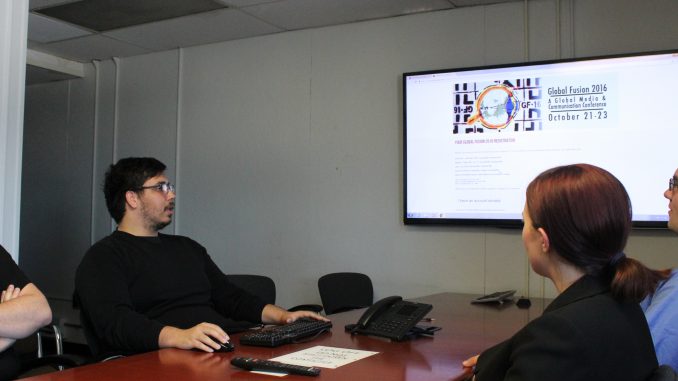
Junior media studies and production major Geena Bevenour wasn’t looking for work, but when she had the opportunity, the full-time student decided to take a job as a student worker at the College of Engineering and add 10 hours of work per week to her schedule.
According to a report from the Georgetown University Center on Education and the Workforce, about 14 million college students work and 40 percent of undergraduates work at least 30 hours a week. Many students are taking on the challenge of working part-time or full-time jobs while keeping up with their studies.
“My uncle was friends with the vice dean of the College of Engineering,” said Benevour, who helps keep track of engineering alumni. “So when the opportunity presented itself being a student worker, it was super flexible and so I figured, ‘Why not?’ It was extra cash and something to put on my resume.”
Daniel Heim, a junior history and Italian major, works in the Honors Lounge in the Tuttleman Learning Center and said his job helps him pay his rent, buy food and earn spending money.
Heim said he doesn’t feel like there are many cons to working and going to school, but thinks “it’s a personal thing.”
“If you feel comfortable with what you’re doing, then keep doing it,” he said. “But if you think that you’re too busy and you need a change, then that’s something that you would have to look into yourself.”

Junior communication studies major Joey Cruz is a commuter who works in the client relations department at the Continuing Education program based out of Carnell Hall.
“I want to say making money is necessary for me, but it’s something I need for transportation and food, because I don’t get a lot of the benefits like someone who dorms at campus,” Cruz said.
“I don’t work a lot, but it’s enough to get by for now,” he added.
Bevenour, Cruz and Heim all work on campus.
Although working as a full-time student can be stressful, Bevenour said she was lucky enough to organize her schedule to her liking.
“I work about 10 hours a week and it is difficult on those days when I have to set my alarm and wake up early to get stuff done because I’m not going to be able to do homework when I work before class,” she said. “It’s definitely a time management exercise.”
“Working has helped me with time management, so knowing when to do certain work and study for certain things. I’ve been more lenient on managing on what stuff I’m doing on time,” Cruz said.
He added that although having a job has helped him time manage well, it has also caused some stress.
“It has definitely added more stress since I’m working and going to school,” he said. “I don’t have much of a social life.”
Heim said he sometimes wishes he could finish his homework immediately after class instead of going to work, but it’s “not really a big issue” for him.
“As long as you can manage having a job and going to school, it’s good for you,” he said.
Bevenour said she finds herself getting overwhelmed with working and studying, but plays club volleyball at Pearson and McGonigle halls to help deal with the stress.
“When there isn’t much stuff going on in the offices, I can do school work, but as for stress, I tend to over-organize myself, so I will stay up late and write out everything I need to do and my stress levels drop once I check off things,” she said.
Bevenour added that one of the “pros” of working is hanging out with coworkers and talking about their similar workloads on particularly stressful days.
“It’s more relaxed environment for me, since I don’t have to go to the city and work,” Cruz said.
Overall, Heim is glad he decided to take a job as a full-time student.
“I think it was a good choice for me to have a job and I think it’s been really beneficial both financially and later careers,” Heim said.
Valerie McIntyre can be reached at valeriemcintyre@temple.edu.


Be the first to comment